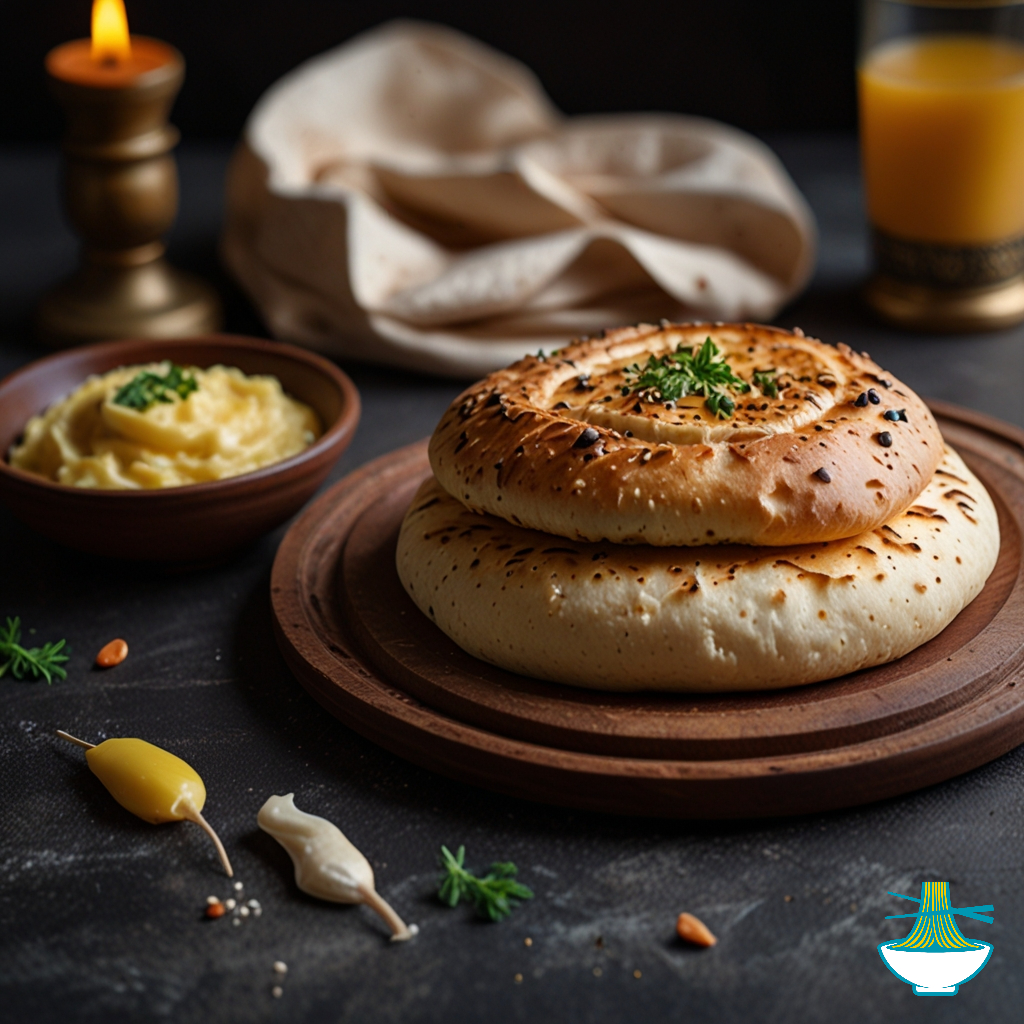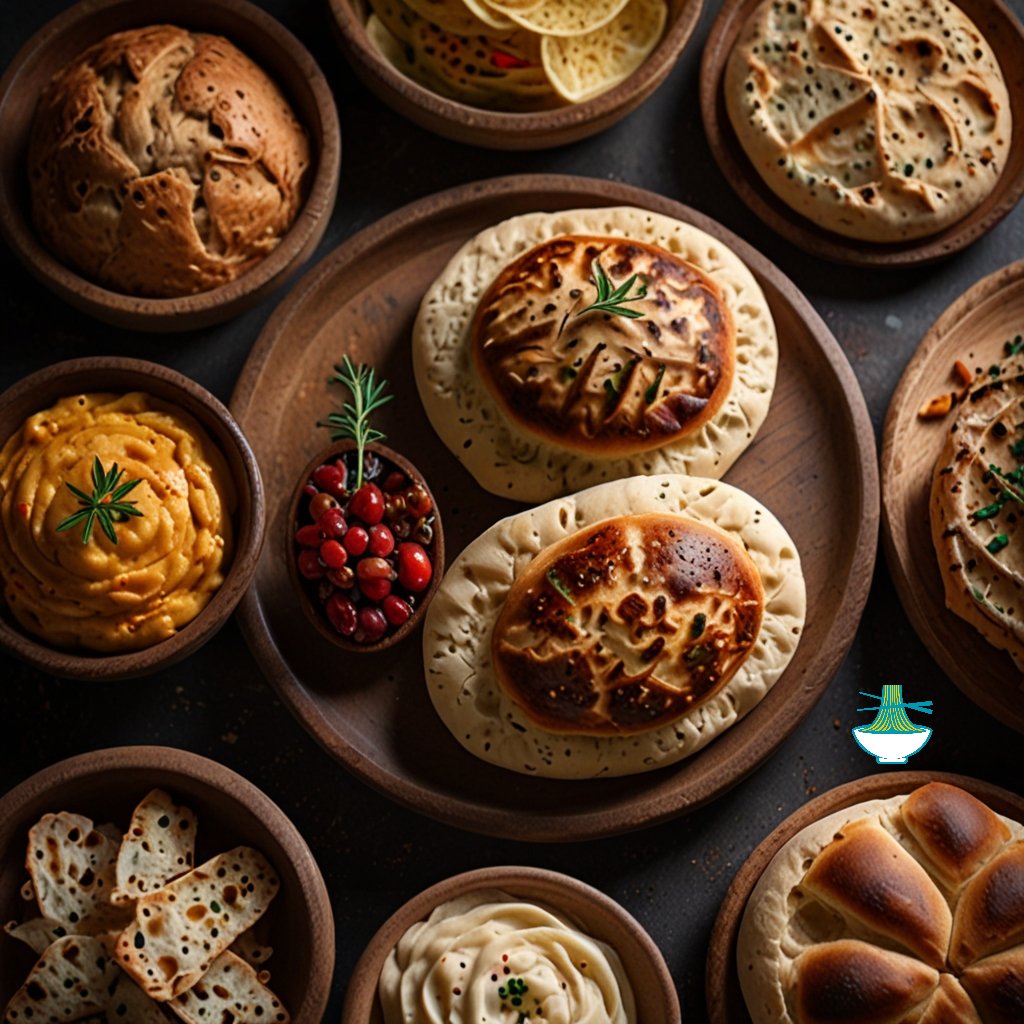Al Khubboz, a staple in Arabic cuisine, is a traditional flatbread with a rich history dating back centuries. Made from simple ingredients like flour, water, yeast, salt, and sometimes a bit of olive oil, this bread is known for its soft texture and slightly chewy crust. 
Its origins trace back to the Bedouin tribes of the Arabian Peninsula, where it was baked in communal ovens and served alongside various dishes like hummus, kebabs, and stews. Over time, Al Khubboz spread throughout the Middle East and North Africa, becoming an integral part of everyday meals and festive gatherings.
The preparation of Al Khubboz involves kneading the dough, allowing it to rise, and then baking it in a hot oven or on a griddle. The result is a versatile bread that pairs well with both savory and sweet accompaniments.
Today, Al Khubboz continues to be cherished for its simplicity, versatility, and cultural significance, serving as a delicious reminder of the rich culinary heritage of the Arab world.
Ingredients:
- 4 cups all-purpose flour
- 1 tablespoon instant yeast
- 1 teaspoon salt
- 1 1/2 cups warm water
- 2 tablespoons olive oil (optional)
Method:
1. In a large mixing bowl, combine the flour, instant yeast, and salt.
2. Gradually add the warm water to the dry ingredients, stirring until a dough forms.
3. Knead the dough on a lightly floured surface for about 5-7 minutes, or until it becomes smooth and elastic.
4. If using olive oil, lightly coat the dough with it and place it back in the mixing bowl. Cover the bowl with a clean kitchen towel and let the dough rise in a warm, draft-free place for about 1 hour, or until it doubles in size.
5. Once the dough has risen, punch it down to release any air bubbles and divide it into equal-sized portions.
6. Preheat your oven to 450°F (230°C) and place a baking stone or baking sheet inside to heat up.
7. Roll out each portion of dough into a circle or oval shape, about 1/4 inch thick.
8. Carefully transfer the rolled-out dough onto the hot baking stone or baking sheet and bake for 5-7 minutes, or until the bread puffs up and the edges start to turn golden brown.
9. Remove the bread from the oven and let it cool slightly before serving with your favorite accompaniments like hummus, kebabs, or other dishes.
Enjoy your homemade Al Khubboz!
Nutrition Value:
1. All-Purpose Flour (4 cups):
- Calories: Approximately 480 kcal
- Carbohydrates: Approximately 100 grams
- Protein: Approximately 12 grams
- Fat: Approximately 1 gram
- Sodium: Negligible
- Cholesterol: None
- Vitamins: Contains small amounts of B vitamins, especially niacin and riboflavin.
- Minerals: Contains small amounts of iron and magnesium.
- Nutritional Benefit: Provides carbohydrates for energy, protein for muscle repair and growth, and small amounts of essential vitamins and minerals.
2. Instant Yeast (1 tablespoon):
- Calories: Approximately 25 kcal
- Carbohydrates: Approximately 3 grams
- Protein: Approximately 3 grams
- Fat: Approximately 0 grams
- Sodium: Approximately 10 milligrams
- Cholesterol: None
- Vitamins: Contains small amounts of B vitamins, particularly B1 (thiamine) and B2 (riboflavin).
- Minerals: Contains small amounts of selenium and iron.
- Nutritional Benefit: Provides essential nutrients for yeast fermentation, contributing to the leavening and flavor of the bread.
3. Salt (1 teaspoon):
- Calories: Negligible
- Carbohydrates: Negligible
- Protein: Negligible
- Fat: Negligible
- Sodium: Approximately 2,300 milligrams (varies based on type of salt)
- Cholesterol: None
- Vitamins: None
- Minerals: Provides essential sodium for electrolyte balance and flavor enhancement.
- Nutritional Benefit: Enhances flavor and texture of the bread, as well as playing a role in controlling yeast fermentation.
4. Warm Water (1 1/2 cups):
- Calories: Negligible
- Carbohydrates: Negligible
- Protein: Negligible
- Fat: Negligible
- Sodium: Negligible
- Cholesterol: None
- Vitamins: None
- Minerals: None
- Nutritional Benefit: Provides hydration for dough formation and yeast activation.
5. Olive Oil (2 tablespoons, optional):
- Calories: Approximately 240 kcal
- Carbohydrates: Negligible
- Protein: Negligible
- Fat: Approximately 28 grams
- Sodium: Negligible
- Cholesterol: None
- Vitamins: Contains vitamin E, providing antioxidant benefits.
- Minerals: Contains small amounts of iron and calcium.
- Nutritional Benefit: Adds richness and flavor to the bread, as well as providing healthy monounsaturated fats. The optional addition of olive oil can also contribute to the texture and moisture of the bread.
Please note that these nutritional values are approximate and may vary based on factors such as brand, processing, and specific recipe variations.


Comments